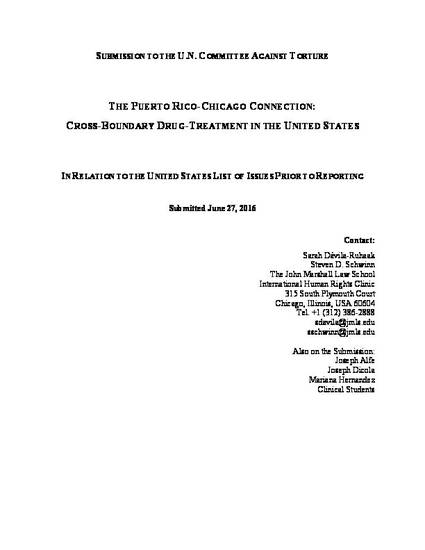
1. The John Marshall Law School International Human Rights Clinic is a law school student-practice clinic that is committed to the investigation of human rights abuses, the publication of abuses, and the protection against abuses within the United States and around the world.
2. The International Human Rights Clinic has been investigating human rights abuses arising out of a systematic practice of government officials and cooperating private individuals to relocate homeless, drug-addicted persons to putative drug-treatment centers in Chicago, Illinois. In fact, these so-called drug-treatment centers deprive individuals of their physical liberty; fail to provide adequate food, shelter, and other necessities; engage in abusive and degrading treatment; and fail to provide adequate medical treatment to victims.
3. Officials of Puerto Rico, an island territory within the jurisdiction of the United States of America, engage in a systematic practice of relocating homeless, drug-addicted Puerto Ricans to sites within the continental United States, including Chicago, for drug treatment.
4. Officials and cooperating private individuals arrange for transportation of these victims from Puerto Rico to the continental United States. Officials and cooperating private individuals also arrange for housing in putative residential drug-treatment centers. These so-called drug treatment centers are often located in overcrowded and uninhabitable or substandard facilities. They are not licensed or regulated.
5. Private operators who run these so-called drug-treatment centers often take their victims’ identification and restrict their victims’ physical liberty. New arrivals are not permitted to leave the premises for 30 days; if they do, they cannot come back. Operators also charge victims a fee, forcing victims to work, or at least to earn money, in exchange for their housing and “treatment.”
6. These so-called drug-treatment centers fail to provide appropriate medical treatment for the victims, resulting in torture or ill-treatment of the victims in violation of the Convention Against Torture. Moreover, these so-called treatment centers frequently deny victims access to adequate food and water. Several victims have died.
7. This practice is well known and actively supported by officials in Puerto Rico and at least several of its municipalities. The practice is well known by officials in the City of Chicago, the State of Illinois, and the U.S. government.
8. This practice constitutes a violation of the Convention Against Torture and Other Cruel, Inhuman or Degrading Treatment or Punishment (the “CAT”).

Submission to the U.N. Committee Against Torture